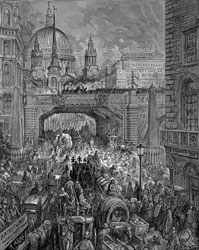



Congested London (Elton Collection:
Ironbridge Gorge Museum Trust)






Industrialisation had many negative effects. Factories were dependent on employees, some as young as five, putting in long hours in often deplorable conditions in order to make the most of the expensive machinery, which dictated the pace of work. Industrial accidents and diseases were common, and people worked without protection with such dangerous materials as mercury and phosphorus.
The rapid growth of British cities was largely unplanned, leading to disorganised sprawls. The poorer areas of the cities were characterised by overcrowded, badly built, unsanitary living accommodation, and filthy streets. Cholera, carried by dirty water, killed 16,000 Londoners in 1849 alone, and smallpox, scarlet fever, typhus, scurvy and rickets were rife. The air was filled with smoke and fumes from the nearby factories. There were fewer opportunities for people to live off the land and be self-sufficient, leading to a culture of dependency. The crime rate rose as social conditions deteriorated. Although many used the improved transport system to emigrate, their dreams were not always fulfilled and they ended up working in similar factories and living in similar slums overseas.
Warfare became mechanised and thereby deadlier. Troops could be moved further and quicker by train, commands could be despatched by telegraph, and breech rifles, machine guns and iron steamships bearing more accurate and powerful weapons increased the level of destruction.
There was also considerable psychological strain caused by the dramatic change in the pace of life. Walter E Houghton described this as follows:
To live in this dynamic, free-wheeling society was to feel the enormous pressure of work, far beyond anything known before. When new and more distant sources of supply and demand were constantly being opened up by the railroad and the steamship, the battle for new markets became intense. To neglect them could mean ruin. So could failure to take advantage of the latest invention or adapt one’s business methods to the most recent developments...
When class lines broke down and it became possible as never before to rise in the world by one’s own strenuous efforts, the struggle for success was complemented by the struggle for rank. Even apart from personal ambitions, the very existence of hundreds of objects, once unknown or within the reach of a few, now made widely available and therefore desirable, increased the size of one’s expenses and the load of his work…
Faster locomotion, of goods and letters and people, simply increased the number of things one crowded into a day, and the rush from one to another...

Hyde Park as it will be, by John Leech
(Elton Collection: Ironbridge Gorge Museum Trust)
